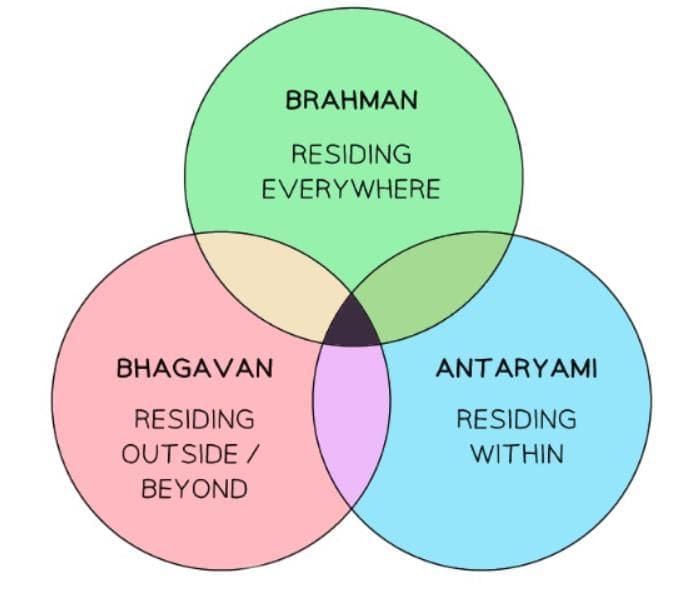Year 11 Exam > Year 11 Notes > Religion, Philosophy & Ethics for GCSE/IGCSE > What are the Three Features of the Divine?
What are the Three Features of the Divine? | Religion, Philosophy & Ethics for GCSE/IGCSE - Year 11 PDF Download
The Three Features of the Divine
For Hindus, God is understood to have three primary aspects: Brahman (present everywhere), Antaryami (present within), and Bhagavan (present outside, beyond).
- Firstly, God is Brahman, which means the Ultimate Reality or truth.
- Brahman represents the all-encompassing aspect of God, often described as ‘the all-pervading world-soul.’
- Because everything originates from God, it is seen as not separate from Him.
- The scriptures declare that “everything is Brahman.” This eternal aspect is understood through the belief that every individual has an atman, which is a part of the one divine reality.
- Secondly, God is Antaryami, the divine presence within a person’s heart.
- Many Hindus focus on Antaryami through meditation to become aware of Brahman.
- Meditation on Antaryami helps individuals find balance and gain a deeper understanding of God.
- Thirdly, God is Bhagavan or Ishvara, a supreme being who exists beyond the physical world.
- Many Hindus believe in forming a close and personal connection with Bhagavan.
- They also believe Bhagavan has divine qualities such as wisdom and power.
- Most Hindu traditions acknowledge these three aspects of God, though they interpret the connections between them in various ways.
- Different traditions often emphasise one aspect more strongly than the others.
- They also hold diverse views on who God is and how the many gods and goddesses fit into their understanding.

The document What are the Three Features of the Divine? | Religion, Philosophy & Ethics for GCSE/IGCSE - Year 11 is a part of the Year 11 Course Religion, Philosophy & Ethics for GCSE/IGCSE.
All you need of Year 11 at this link: Year 11
|
172 docs|3 tests
|
FAQs on What are the Three Features of the Divine? - Religion, Philosophy & Ethics for GCSE/IGCSE - Year 11
| 1. What are the Three Features of the Divine? |  |
Ans. The Three Features of the Divine typically refer to the attributes that many religious traditions ascribe to the divine being or beings. These commonly include omnipotence (all-powerful), omniscience (all-knowing), and omnipresence (present everywhere). These features help to characterize the nature of divinity in various faiths.
| 2. How do the Three Features of the Divine apply to different religions? |  |
Ans. Different religions interpret the Three Features of the Divine in unique ways. For instance, in monotheistic religions like Christianity, Judaism, and Islam, God is viewed as embodying all three characteristics. In contrast, some polytheistic traditions may attribute these features to specific deities or view them in a more symbolic context. Understanding these differences enriches the study of theology and comparative religion.
| 3. Why is the concept of the Three Features of the Divine important in theology? |  |
Ans. The concept of the Three Features of the Divine is crucial in theology as it shapes the understanding of God’s nature, relationship with humanity, and the universe. It serves as a foundation for various doctrines and beliefs, influencing worship practices, moral teachings, and the overall worldview of believers.
| 4. Can the Three Features of the Divine coexist with other philosophical ideas? |  |
Ans. Yes, the Three Features of the Divine can coexist with various philosophical ideas. For example, many philosophical frameworks explore the implications of an omnipotent and omniscient being on free will and morality. Philosophers like Augustine and Aquinas have engaged with these concepts, attempting to reconcile divine attributes with human experience and ethical considerations.
| 5. How do the Three Features of the Divine influence ethical behavior in believers? |  |
Ans. The Three Features of the Divine significantly influence ethical behavior in believers by establishing a moral framework. The belief in an omniscient deity encourages adherence to moral standards, knowing that one's actions are observed. Omnipotence instills a sense of accountability, while omnipresence fosters a continuous awareness of moral conduct. These features collectively guide individuals in their decision-making and ethical practices.
Related Searches




















